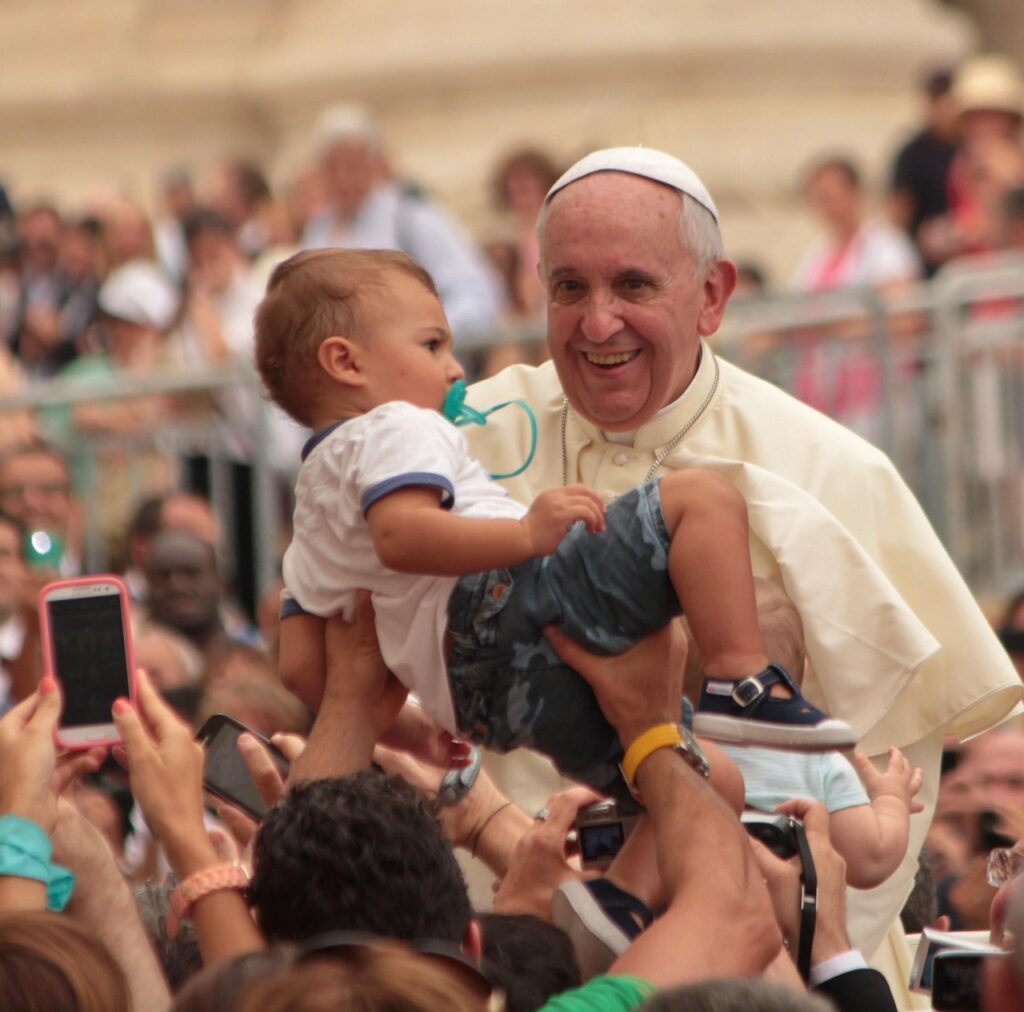Twelve years ago, Diana and I were sitting in a bar in Davenport, California, enjoying a beer after a day of planning for our Team Initiation ministry. We were looking out the window as the sun was beginning to set over the Pacific Ocean when the bartender suddenly turned up the TV volume.
CNN was announcing news from the Vatican. We had a new pope. I remember feeling overwhelmed with hope and joy and anticipation as details were reported in fits and starts about who was elected, where he was from, what name he would choose, what kind of pope he might be.
Every pope in my lifetime has a special place in my heart and in the church. But Pope Francis is extra special. He has been pope for twelve of the sixteen years that we have been doing this ministry. And his love for those on the margins was so strong and clear that we adopted his formulation of the kerygma as part of our mission statement:
Our mission is to communicate this one message to seekers:
Jesus Christ loves you;
he gave his life to save you;
and now he is living at your side every day
to enlighten, strengthen and free you.
Now that the sun has set on his papacy, we want to recall three things we have learned from Pope Francis that are especially important for catechumenate ministers. Each of these flow from the kerygma.
1. The church is a field hospital
One of the first things Pope Francis said after he was elected was, “Go forth!” He meant that literally. From the beginning of his papacy until his last breath, he has urged every Catholic to actively go out into the world to proclaim the good news to others that Jesus Christ loves them. He has often said that the world is in a crisis unlike anytime previous. The poor and the outcast are not merely being pushed to the margins. They are being made invisible. It is to those most in need, most desperate, most isolated to whom we much immediately go to and offer them the liberating love of Jesus.
The pope likened the church to a field hospital – a community of compassion and healing whose first priority is those who are most wounded. And we have to attend to their greatest wound first. Early in his papacy, he said:
It is useless to ask a seriously injured person if he has high cholesterol and about the level of his blood sugars! You have to heal his wounds. Then we can talk about everything else. Heal the wounds, heal the wounds…. And you have to start from the ground up. (America Magazine, September 30, 2013)
When I first read that, I felt like the pope was talking to my younger self. When I started in catechumenate ministry, I deeply misunderstood the task. I thought my job was to teach doctrine. In fact, my job – and the job of every catechumenate minster – is to first of all heal the wounds, heal the wounds.
2. Listening is the first movement of evangelization
Of course, we are not a literal field hospital. Usually the wounds that need healing are internal and not immediately apparent. So how will we know what wounds need binding if we cannot see them? Pope Francis taught that the first step in “announcing” the good news is not actually announcing anything. Rather, what we have to do first is listen.
We need to practice the art of listening, which is more than simply hearing.
Listening, in communication, is an openness of heart which makes possible that closeness without which genuine spiritual encounter cannot occur.
Listening helps us to find the right gesture and word which shows that we are more than simply bystanders.
Only through such respectful and compassionate listening can we enter on the paths of true growth and awaken a yearning for the Christian ideal: the desire to respond fully to God’s love and to bring to fruition what he has sown in our lives. (Joy of the Gospel, 171)
3. Accompaniment is the method of catechesis
One of the cornerstones of Pope Francis’s ministry, and what he will always be remembered for, is the way he both taught and embodied the art of accompaniment.
Pope Francis message for all catechists is that we must practice the “‘art of accompaniment’ which teaches us to remove our sandals before the sacred ground of the other (cf. Ex 3:5). The pace of this accompaniment must be steady and reassuring, reflecting our closeness and our compassionate gaze which also heals, liberates, and encourages growth in the Christian life” (Joy of the Gospel, 169).
Catechetical ministry is mostly walking along the road with believers as we are led forward by the Holy Spirit. The Directory for Catechesis, which was published under Pope Francis’s guidance and influence, says, “The true protagonist of all authentic catechesis, is however, the Holy Spirit, who by means of the profound union with Jesus Christ, which is nurtured by every catechist, gives efficacy to human efforts in catechetical activity” (112).
Pray for us, Pope Francis
There is so much more that Pope Francis has taught us. We have to smell like the sheep. Jesus is the face of mercy. Do not become ill by staying shut up inside the church. Do not be afraid to get bruised out in the world. We have to recover the capacity for symbol. Who am I to judge?
But for catechumenate ministers, if we can remember to go forth, to heal the wounds, and to let the Holy Spirit lead us as we accompany seekers, all of the rest will follow.
When the news reporter in the screen above bar announced that the new pope would take the name “Francis,” he immediately turned the broadcast back to the live feed of the papal balcony. The new pope was about to appear.
Francis stood in front of the world, bowed his head, and asked us to pray for him. Now we must ask him to pray for us.
More teaching from Pope Francis
Here are a few articles about Pope Francis’s teaching on the ministry of the catechist:
- Going forth: The audacity of being a catechist
- Can our parishes truly become missionary?
- From maintenance to mission: Revitalizing our parishes for the future
- Can your parish change the world? What would happen if…?
Click this link to see all the articles we have written over the years about Pope Francis’s teaching as it relates to the catechumenate.
What did Pope Francis teach you?
What memories do you have of Pope Francis? What did you learn from him? Please share your thoughts in the comments section below.


















